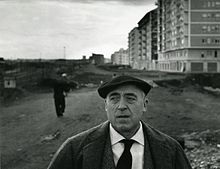Cesare Zavattini
| Cesare Zavattini | |
|---|---|

Cesare Zavattini (photo by Paolo Monti, 1975)
|
|
| Born |
20 September 1902 Luzzara, Italy |
| Died | 13 October 1989 (aged 87) Rome, Italy |
| Nationality | Italian |
| Occupation | Screenwriter |
| Years active | 1936–1975 |
Cesare Zavattini (20 September 1902 – 13 October 1989) was an Italian screenwriter and one of the first theorists and proponents of the Neorealist movement in Italian cinema.
Born in Luzzara, near Reggio Emilia in northern Italy, on 20 September 1902, Zavattini studied law at the University of Parma, but devoted himself to writing. In 1930 he relocated to Milan, and worked for the book and magazine publisher Angelo Rizzoli. After Rizzoli began producing films in 1934, Zavattini received his first screenplay and story credits in 1936. In 1935, he met Vittorio De Sica, beginning a partnership that produced some twenty films, including such masterpieces of Italian neorealism as
In 1952, Zavattini gave an interview to The Italian Film Magazine 2, republished in English as "Some Ideas on the Cinema." The thirteen points Zavattini outlined are widely regarded as his manifesto to Italian neorealism.
In his only experience in Hollywood, Zavattini wrote the screenplay for The Children of Sanchez (1978) based on Oscar Lewis’s book of the same title, a classic study of a Mexican family. At the 11th Moscow International Film Festival in 1979, he was awarded the Honorable Prize for the contribution to cinema. In 1983 he was a member of the jury at the 13th Moscow International Film Festival.
Zavattini died in Rome on 13 October 1989. He was an atheist.
Among the many celebrated directors of Italian and international cinema Zavattini worked with in his more than 80 films are:
Also, In the short story "La Santa," by Nobel Prize winner Gabriel García Márquez a character is named after Zavattini. In the story, the character is a teacher of cinema.
...
Wikipedia
